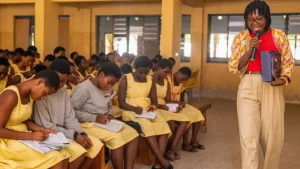Known in Ghana as the Maths Queen, Dr Angela Tabiri is the first African to win The Big Internet Math Off competition – quite an achievement for someone who had not initially planned to study mathematics.
The 35-year-old Ghanaian “finds joy in solving puzzles and mathematical questions” and hopes her 2024 win will open up the world of mathematics to other African women – who have traditionally been discouraged from taking the subject.
Sixteen mathematicians were invited to compete for the tongue-in-cheek title of “the world’s most interesting mathematician” – a public vote event started in 2018 by The Aperiodical blog.
The first winner was Dr Nira Chamberlain, the first black mathematician to be included in the British reference book Who’s Who and a vice-president of the professional body, the Institute of Mathematics and its Applications.
During the event they all compete against each other – so two in each match – and then it goes to quarter-finals and semi-finals until the big match to decide who has explained their chosen mathematical concept in the most illuminating way.
Dr Tabiri’s passion is quantum, or non-commutative, algebra, which she researches at the Ghana branch of the African Institute for Mathematical Sciences (Aims).
Aims started in South Africa and then expanded to Ghana, Senegal, Cameroon, and Rwanda to provide post-graduate training and research in science, technology, engineering, and mathematics.
Mentoring
Dr Tabiri is also the academic manager for the Girls in Mathematical Sciences Programme, a mentoring and support scheme for high – or secondary school girls in Ghana.

It was set up by Aims-Ghana in 2020 to “ensure that we have a pipeline of young girls who will be leading in research and innovation in the mathematical sciences – in academia and also industry.”
Dr Tabiri says the numbers of girls and boys studying maths at high school are roughly equal but then drop off at university level.
This is partly because, she says, female students assume is that if they do maths, the only job they can do is teach, because maths is still seen as a “boy’s subject” – and there are very few female role models.
This is something Dr. Tabiri is trying to change.
But her journey into maths was not straightforward.
She grew up in Ashaiman, one of the poorer, densely populated neighbourhoods of Tema, an industrial hub and port an hour’s drive east of the capital, Accra.
Her family home was happy but noisy – she has four sisters – and Dr Tabiri would often seek out the peace and quiet of the local youth community centre so that she could study.
She wanted to follow in the footsteps of two sisters and study business administration at university.
But her grades, although high, were not high enough – and so she was accepted instead for mathematics and economics.
“It was a blessing in disguise,” Dr Tabiri says. “Numbers and puzzles fascinated me – but I never thought a career in maths was for me.”
In 2015, Dr. Tabiri got a scholarship to do her PhD. at Glasgow University in Scotland. It was hard work, she says – and it was there that she experienced a seminal moment.
She went to see Hidden Figures, the film about black American women mathematicians who worked at the US space agency, Nasa, in the 1950s, during the era of segregation in the US.
“It was amazing seeing the story of these black women told on that global stage,” she remembers. “I had a lot of goose bumps watching it.”
She was particularly inspired by Katherine Johnson, whose extraordinary mathematical skills and calculations were so crucial to the success of US space flights.
BBC/Shakirat Sadiq


Comments are closed.